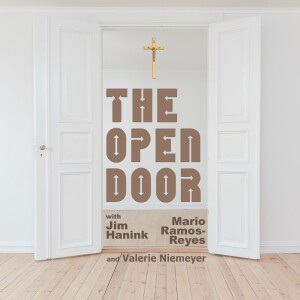
Episode 259: Dr. Marc Tumeinski on a Theology of Disability (May 10, 2023)
 2023-05-12
2023-05-12
Download
Right click and do "save link as"
Next up on The Open Door (May 10th), we discuss a theology of disability and its philosophical commitments. How is it that we can best see and serve disabled persons? What lessons can they, in turn, teach us? Our welcome guest is Dr. Marc Tumeinski of Anna Maria College and Holy Apostles College and Seminary. His doctoral research brought together in ecumenical dialogue the writings of Joseph Ratzinger/Benedict XVI and John Howard Yoder. Among the questions we will ask are the following.
1. Dr. Tumeinski, Marc, if we may, could you please tell us a bit about Anna Maria College and its mission?
2. How did you come to your special focus on disabilities?
3. You collaborate closely with your wife, Jo Massarelli. Do her interests and skills complement your own?
4. Can you explain “Social Role Valorization”? And would you introduce us to the SRV Journal?
5. What connections do you see between peacemaking, the Church, and Christians with impairments?
6. You have put forward an ethical analysis of the use of physical and mechanical restraints in care of disabled people. Could you describe current practices in the use of restraints and the reforms you propose?
7. Drawing on St. John of Damascus, St. Thomas Aquinas explains our being made in God’s image with reference to our capacities for reason and free choice. What does his account mean in case of people with severe disabilities?
8. The theologian Pia Matthews contends that Patristic resources emphasize the discerning, rather than the defining, of persons. What do you think of this emphasis?
9. A significant number of homeless people suffer from both severe mental illness and long term drug addiction. What guidelines would you propose for responding to homeless persons with this “dual diagnosis”?
10. How can the Church serve, to use Joseph Ratzinger’s phrase, as a creative minority?
view more
1. Dr. Tumeinski, Marc, if we may, could you please tell us a bit about Anna Maria College and its mission?
2. How did you come to your special focus on disabilities?
3. You collaborate closely with your wife, Jo Massarelli. Do her interests and skills complement your own?
4. Can you explain “Social Role Valorization”? And would you introduce us to the SRV Journal?
5. What connections do you see between peacemaking, the Church, and Christians with impairments?
6. You have put forward an ethical analysis of the use of physical and mechanical restraints in care of disabled people. Could you describe current practices in the use of restraints and the reforms you propose?
7. Drawing on St. John of Damascus, St. Thomas Aquinas explains our being made in God’s image with reference to our capacities for reason and free choice. What does his account mean in case of people with severe disabilities?
8. The theologian Pia Matthews contends that Patristic resources emphasize the discerning, rather than the defining, of persons. What do you think of this emphasis?
9. A significant number of homeless people suffer from both severe mental illness and long term drug addiction. What guidelines would you propose for responding to homeless persons with this “dual diagnosis”?
10. How can the Church serve, to use Joseph Ratzinger’s phrase, as a creative minority?
More Episodes
WCAT Radio The Open Door (November 17, 2017)
 2019-01-14
2019-01-14
 2019-01-14
2019-01-14
WCAT Radio The Open Door (November 10, 2017)
 2019-01-14
2019-01-14
 2019-01-14
2019-01-14
WCAT Radio The Open Door (November 3, 2017)
 2019-01-14
2019-01-14
 2019-01-14
2019-01-14
WCAT Radio The Open Door (October 27, 2017)
 2019-01-14
2019-01-14
 2019-01-14
2019-01-14
WCAT Radio The Open Door (October 20, 2017)
 2019-01-13
2019-01-13
 2019-01-13
2019-01-13
WCAT Radio The Open Door (October 13, 2017)
 2019-01-13
2019-01-13
 2019-01-13
2019-01-13
WCAT Radio The Open Door (October 6, 2017)
 2019-01-13
2019-01-13
 2019-01-13
2019-01-13
WCAT Radio The Open Door (September 8, 2017)
 2019-01-13
2019-01-13
 2019-01-13
2019-01-13
WCAT Radio The Open Door (September 1, 2017)
 2019-01-13
2019-01-13
 2019-01-13
2019-01-13
WCAT Radio The Open Door (August 18, 2017)
 2019-01-13
2019-01-13
 2019-01-13
2019-01-13
WCAT Radio The Open Door (August 11, 2017)
 2019-01-13
2019-01-13
 2019-01-13
2019-01-13
WCAT Radio The Open Door (August 4, 2017)
 2019-01-13
2019-01-13
 2019-01-13
2019-01-13
WCAT Radio The Open Door (July 28, 2017)
 2019-01-13
2019-01-13
 2019-01-13
2019-01-13
WCAT Radio The Open Door (July 21, 2017)
 2019-01-13
2019-01-13
 2019-01-13
2019-01-13
WCAT Radio The Open Door (July 14, 2017)
 2019-01-13
2019-01-13
 2019-01-13
2019-01-13
WCAT Radio The Open Door (July 7, 2017)
 2019-01-13
2019-01-13
 2019-01-13
2019-01-13
WCAT Radio The Open Door (June 30, 2017)
 2019-01-13
2019-01-13
 2019-01-13
2019-01-13
WCAT Radio The Open Door (June 23, 2017)
 2019-01-13
2019-01-13
 2019-01-13
2019-01-13
012345678910111213141516171819
Create your
podcast in
minutes
- Full-featured podcast site
- Unlimited storage and bandwidth
- Comprehensive podcast stats
- Distribute to Apple Podcasts, Spotify, and more
- Make money with your podcast
It is Free
- Privacy Policy
- Cookie Policy
- Terms of Use
- Consent Preferences
- Copyright © 2015-2024 Podbean.com




